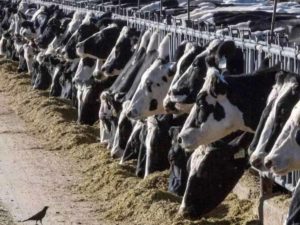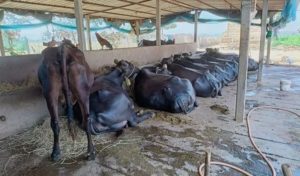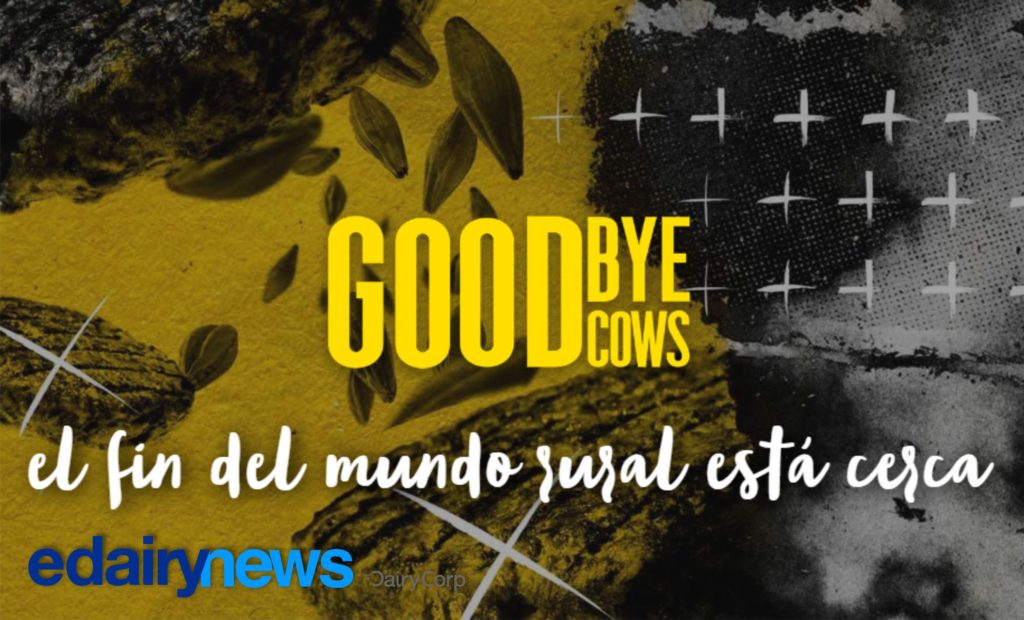“For the first time in my life I’ve put my hand inside a cow and felt the cervix,” she recalls in an interview with The Better India. With his support, she carried out an internal examination, checking the dilation of the cervix and confirming where the calf’s head was. He then guided her on how to soothe the cow till the birth.
This, Milan recalls, was a breakthrough for her as she earlier used to gather her clothes around her and walk cautiously, making sure no animal on her family farm touched her.
The former German language teacher co-founded Revnar Farms with her husband Chetan Sharma and has implemented a sustainable, organic farming model.
Today, the farm has 50 adult cows and 70 calves. “They are lovely, adorable beings and we enjoy being around the animals,” says Chetan.
Twelve acres of the land are used for fodder cultivation and 21 acres for grains, pulses and seeds. These products are sold through direct orders and their website, clocking an annual revenue of Rs 70 lakh on average.
Farm calling
After completing her Masters in Biochemistry, Milan got married and was a homemaker for several years. Once her sons were all grown up, she started learning German as a hobby. This turned into a profession where she spent several years teaching the language at Amity International School. She was also a member of the Central Board of Secondary Education (CBSE) syllabus committee, co-authoring several German language textbooks.
In January 2017, after her father-in-law, who owned four cows and a farmland, passed away, things changed for Milan. In memory of his father, Chetan bought two more cows. Over the months, they purchased more cows, and by early 2018 they had 35 cows on their land. But around April, they lost five of the animals. “That was a jolt, that they aren’t machines that have stopped working. They’re living beings and somebody has to be there to look after them,” recalls the 52-year-old.
This prompted her to quit her job and focus on the farm full-time. Under Dr AK Singh at Karnal’s National Dairy Research Institute (NDRI), she undertook two one-month courses on commercial dairy farming and value addition to milk products. In August 2018, she took over the farm. “From cutting crops to hand milking the cattle and understanding what amount of concentrate to feed each animal, I became involved in everything,” she says. Over the first two years of business, the family invested Rs 1.5 crore to get the business up and running.
Given the abundance of cattle, they’d started with dairy farming, using the milk at home and then sending the excess to friends and family. As word spread, the business took off, as more and more customers started buying their milk. But Milan soon realised that selling milk alone wouldn’t sustain the business.
Today, they also sell grains, oils, and other products. The farm has grains like wheat, jowar (sorghum), bajra (pearl millet), pulses like arhar (pigeon pea), moong (mung bean), and urhad (vigna mungo), and seeds like sesame and mustard, among others.
Revnar Farm’s products are sold online through their website and they also sell the farm’s byproducts. One kg paneer is sold at Rs 675, 850 ml mustard oil is sold at Rs 299, and one kg of dried and powdered khad (slurry) is sold for Rs 70 and more.
Sustainable, natural and organic farming
On their farm, the couple practises organic, cow-based farming, using sustainable methods. They eliminate all pesticides and harmful chemicals from the agricultural process to offer natural, healthy products.
To understand how to go about setting up the farm and putting these practices in place, Milan has been engaged in continuous research. She learns about new ideas and perspectives through consistently visiting nearby universities and speaking with faculty there. She regularly visits the CCS Haryana Agricultural University and Lala Lajpat Rai University of Veterinary & Animal Sciences in Hisar, Guru Angad Dev Veterinary & Animal Sciences University in Ludhiana, and Uttar Pradesh Pandit Deen Dayal Upadhyaya Pashu Chikitsa Vigyan Vishwavidyalaya Evam Go-Anusandhan Sansthan (DUVASU) in Mathura, among others. “I was pleasantly surprised that every professor, everywhere, gives all their time and information. It has been a wonderful experience.”
Among their sustainable practices are intercropping, so even if one crop doesn’t give enough yield they have others to rely on; adding furrows and ridges along the field, making it easier to supply gobar slurry and making the weeding process more efficient; the use of sprinklers instead of flooding the field which conserves water and saves on the electricity a pump would use. And Chetan says, “The farm has an eight-kilowatt off-grid solar system which we installed ourselves.”
Milan started making jeevamrut (a natural liquid fertiliser) and beejamrut (a solution with microbes that are beneficial to plants) and following Indian agriculturalist Subhash Palekar’s books and his zero-budget farming model. “I combined this with prakritik kheti (natural farming).”
For instance, the soil and crop are nourished using a mixture of cow dung, cow urine, tree leaves, jaggery, and besan (gram flour). Instead of pesticides, plants are kept pest-free through a concoction of cow urine, neem, garlic, green chillies, and fermented buttermilk. Moringa is used to provide minerals to plants instead of purchasing a packaged mineral mixture from the market – being organic and saving money at the same time. The farm also has an 80 cubic metre gobar gas plant where all the cooking for the farm is carried out, and which offers ample slurry that’s used as manure. “Nothing artificial is used in my fields,” she says. “This also saves on the expense of anything chemical or sprays,” she adds.
The animals are also treated using natural practices, following the booklets on ethnoveterinary medication published by the National Dairy Development Board (NDDB) and the state’s Animal Husbandry Department. “These medicines are sourced from plants and trees like chuimui (shame plant), peppermint leaves, aloe vera, and more.” She explains that she prefers these to antibiotics for several reasons. One, those medicines come with a 72-hour milk withdrawal period, meaning the milk produced by the animal during this time should not be consumed by humans. Two, the antibiotics cause stress to the animal. And three, they are often more expensive than natural methods.
While using natural, sustainable methods reduces costs for the business, Milan says they are also committed to providing the highest quality products to market. “The first lesson I’d learnt at NDRI was that value addition always adds to your products’ price and gives better profits,” she recalls. Revnar Farm thus offers processed oil instead of just seeds, dried and powdered manure, havan sticks made of cow dung, and dals that are cleaned and processed. They also offer processed dairy products like butter, paneer, chaas (buttermilk), and more.
As they continue to grow their business, the couple’s love and fondness for the animals also increases manifold. Milan slowly realised that they recognise love and care and respond to it in kind and they have come to recognise her. “My voice and presence are soothing for them, and their presence for me,” she says.










